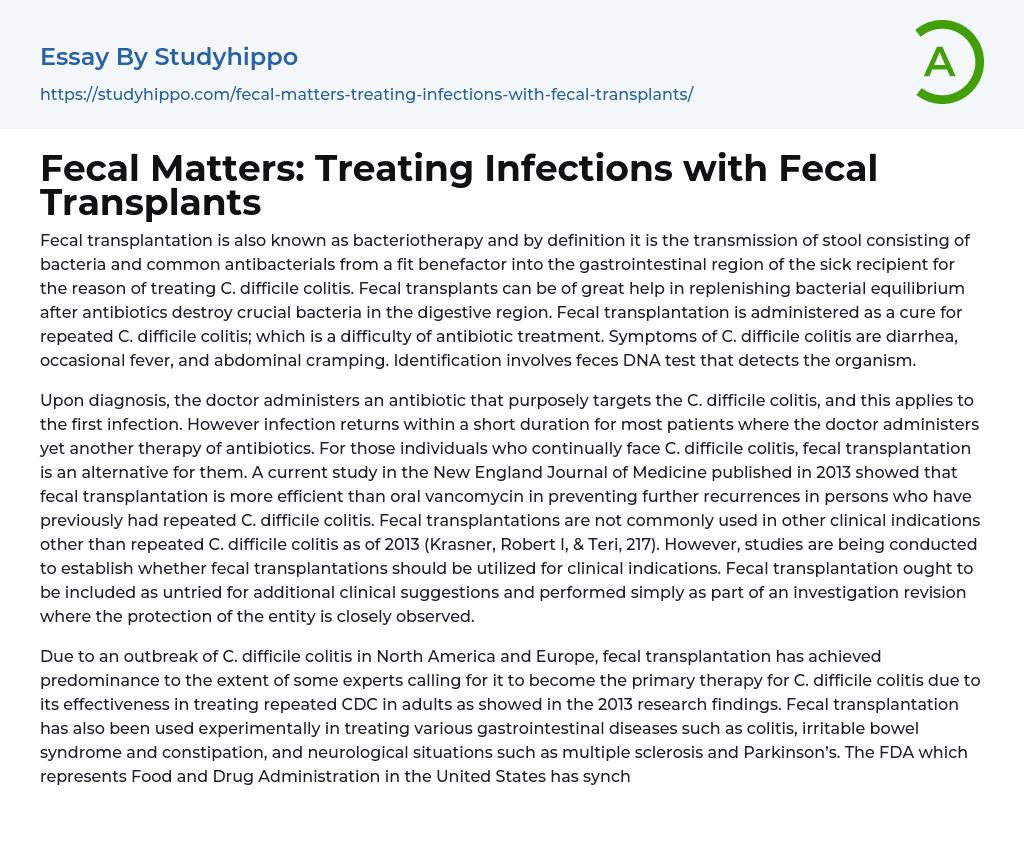

Fecal Matters: Treating Infections with Fecal Transplants Essay Example
Fecal transplantation, also known as bacteriotherapy, involves transferring stool from a healthy donor to the gastrointestinal tract of an ill recipient. The purpose is to treat C. difficile colitis by restoring bacterial balance in the digestive area after antibiotics have eliminated important bacteria. Fecal transplantation serves as a therapeutic intervention for recurrent C.
When encountering challenges in the use of antibiotics, C. difficile colitis can develop. This condition is distinguished by symptoms like diarrhea, sporadic fever, and abdominal cramping. To diagnose this condition, a feces DNA test is conducted to identify the microorganism causing the illness. After diagnosis, doctors prescribe a targeted antibiotic treatment for C. difficile colitis.
Despite multiple rounds of antibiotics, many patients experience a rapid reoccurrence of infection. In these situations, doctors may choose fecal transplantation as an alternative treatment for individ
...uals who consistently suffer from C. difficile colitis. A study conducted in 2013 and published in the New England Journal of Medicine found that fecal transplantation was more effective than oral vancomycin in preventing future relapses among patients with a history of recurring episodes of C. difficile colitis.
According to Krasner, Robert I, and Teri (2013, 217), the primary use of fecal transplantations is currently for treating recurrent C. difficile colitis. However, ongoing research aims to explore other potential medical uses for fecal transplantations. It is important to note that these additional uses should be considered experimental and conducted as part of a comprehensive investigation with a strong focus on ensuring the safety of individuals.
Fecal transplantation, also known as fecal microbiota transplantation (FMT), has emerged as the leading therapy in North America and Europe for treating C. difficile colitis. Some experts even propose tha
it should be considered the primary treatment. In 2013, a study demonstrated its effectiveness in managing recurrent cases of C. difficile infection among adults. FMT has also been experimentally used to address various gastrointestinal conditions like colitis, irritable bowel syndrome (IBS), and constipation. Additionally, there is potential for using FMT to treat neurological disorders such as multiple sclerosis (MS) and Parkinson’s disease.
The Food and Drug Administration (FDA) started regulating human stool as a trial drug in 2013. This means that fecal administration can now be conveniently done through pill form, eliminating the need for surgery and providing an advantage for individuals who have aversions to pain.
The choice of how to administer fecal transplantation depends on convenience and appropriateness. Administration methods include introducing fecal bacteria from a healthy donor into the patient's body through procedures such as colonoscopy, nasoduodenal tube, or nasogastric tube (Johns Hopkins, n.p). Fecal transplant plays a crucial role in establishing a healthy condition in patients who are vulnerable to C. difficile infection. In 2012, scientists at the Massachusetts Institute of Technology established OpenBiome as the first publicly accessible stool bank in the United States. OpenBiome provides healthcare professionals with frozen stool samples for treating C.
The utilization of fecal transfer offers a lasting solution to individuals suffering from repeated C. difficile and other related clinical problems. Fecal transplantation is relevant today because it aids in the clinical investigation of additional indications. Patients receiving fecal transfer have the opportunity to choose their donors, with some preferring individuals close to them. Safety standards for donor selection are also highly considered, with factors like BMI, lipids, liver and renal system functionality, and blood counts being tested.
In
the digital age, it is essential to stay informed about fecal transplant (FT) as the internet provides comprehensive information and detailed instructions for self-administration of this treatment.
Work Cited
- Johns Hopkins, Gastroenterology and Hepatology, 2016. Retrieved from http://www.hopkinsmedicine.org/gastroenterology_hepatology/clinical_services/advanced_endoscopy/fecal_transplantation.html
- Krasner, Robert I, and Teri Shors. The Microbial Challenge: A Public Health Perspective. Burlington, Mass: Jones ; Bartlett Learning, 2013. Print.
- Poison essays
- Action Potential essays
- Nervous System essays
- Childbirth essays
- Puberty essays
- Blood essays
- Kidney essays
- Neuron essays
- Body essays
- Glucose essays
- Sense essays
- Heart essays
- Skeleton essays
- Human Physiology essays
- Eye essays
- Immune System essays
- Muscle essays
- Skin essays
- Brain essays
- Central Nervous System essays
- Human Skin Color essays
- Digestive System essays
- Common sense essays
- Respiration essays
- Addiction essays
- Anatomy and Physiology essays
- Biodegradation essays
- Cancer essays
- Dental Care essays
- Disability essays
- Disease essays
- Disorders essays
- Health Care essays
- Infectious Disease essays
- Inquiry essays
- Intelligence Quotient essays
- Lung Cancer essays
- Medicine essays
- Neurology essays
- Nutrition essays
- Olfaction essays
- Physical Exercise essays
- Public Health essays
- Sex essays
- Women's Health essays
- World health organization essays
- Dna essays
- Gene essays



